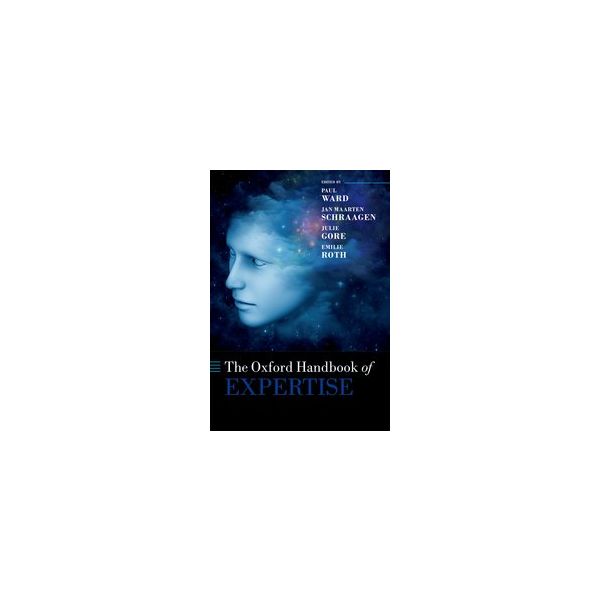| Table Of Content |
1: An Introduction to the Handbook, Communities of Practice, and Definitions of Expertise, Paul Ward, Jan Maarten Schraagen, Julie Gore, and Emilie Roth
Section One: Characterising Expertise: Frameworks, Theories and Models
2: The Classic Expertise Approach and its Evolution, Fernand Gobet
3: Domain-General Models of Expertise: The role of cognitive ability, David Z. Hambrick, Alexander P. Burgoyne, and Frederick L. Oswald
4: Studies of Expertise and Experience: A sociological perspective on expertise, Harry Collins and Robert Evans
5: Giftedness and Talent Development in Children and Youth, Steven I. Pfeiffer
6: Neural Mechanisms of Expertise, Fredrik Ullén, Örjan de Manzano, and Miriam A. Mosing
7: Modeling Experts with Fast-and-Frugal Heuristics, Ulrich Hoffrage
8: Expertise: A holistic, experience-centered perspective, John M. Flach and Fred A. Voorhorst
9: Macrocognitive Models of Expertise, Robert J B Hutton
10: Cognitive Systems Engineering: Expertise in sociotechnical systems, Neelam Naikar and Ashleigh Brady
11: Is Expertise All in the Mind? How embodied, embedded, enacted, extended, situated and distributed theories of cognition account for expert performance, Chris Baber
12: Adaptive Expertise, Katerina Bohle Carbonell and Jeroen J. G. van Merrienboer
Section Two: Methods to Study, Test, Analyse and Represent Expertise
13: Representative Test and Task Development and Simulated Task Environments, Kevin R. Harris, Nicholas A. Foreman, and David W. Eccles
14: Developing Mastery Models to Support the Acquisition and Assessment of Expertise, Karol G. Ross and Jennifer K. Phillips
15: Computational Models of Expertise, Alex Kirlik and Michael D. Byrne
16: Studying Expert Behavior in Sociotechnical Systems: Hierarchical task analysis, Paul M. Salmon, Neville A. Stanton, Guy H. Walker, and Gemma J.M. Read
17: A Historical Perspective on Introspection: Guidelines for eliciting verbal and introspective-type reports, Paul Ward, Kyle Wilson, Joel Suss, William Douglas Woody, and Robert R. Hoffman
18: 'Close to Practice' Qualitative Research Methods, Sarah Yardley, Karen Mattick, and Tim Dornan
19: Incident-based Methods for Studying Expertise, Laura Militello and Shilo Anders
20: Cognitive Work Analysis: Models of expertise, Catherine M. Burns
21: Reflections on the Professional Practice of Knowledge Capture, Brian Moon
22: Stress, Skilled Performance, and Expertise: Overload and Beyond, Gerald Matthews, Ryan W. Wohleber, and Jinchao Lin
Section Two: Domains and Applications
23: Expertise in STEM Disciplines, David. F. Feldon, Soojeong Jeong, and Joana Franco
24: A Cognitive Examination of Skill and Expertise in Word Games and Puzzles, Shane T. Mueller
25: Musical Expertise, Jennifer Mishra
26: Skilled Anticipation in Sport: Past, present, and future, A. Mark Williams, Bradley Fawver, David P. Broadbent, Colm P. Murphy, and Paul Ward
27: Diagnostic Reasoning and Expertise in Healthcare, Vimla L. Patel, David Kaufman, and Thomas G Kannampallil
28: Firefighting and Emergency Responding, Mark Wiggins, Jamie Auton, and Melanie Taylor
29: Expertise in Aviation, Christopher D. Wickens and Frederic Dehais
30: Railroad Operations: Uncovering expertise for safe and efficient performance in railroad operations, Emilie M. Roth, Anjum Naweed, and Jordan Multer
31: The Cyber Domains: Understanding expertise for network security, Robert Thomson
32: Expertise in Intelligence Analysis, Michael P. Jenkins and Jonathan D. Pfautz
33: Expertise in Law Enforcement, Joel Suss and Laura Boulton
34: Military Expertise, J.D. Fletcher and Dennis Kowal
35: Expertise in Business: Evolving with a changing world, Lia DiBello
36: Teamwork in Spaceflight Operations, Ute Fischer and Kathleen Mosier
37: Developing Operator Expertise on Nuclear Power Production Facilities and Oil and Gas Installations, Margaret Crichton (†), Scott Moffat, and Lauren Crichton
38: Expertise in Weather Forecasting, Daphne S. LaDue, Phaedra Daipha, Rebecca M. Pliske, and Robert R. Hoffman
Section Three: Developing, Accelerating, and Preserving Expertise
39: Expertise for the Future: A new challenge for education, Lauren B. Resnick, Jennifer Lin Russell, and Faith Schantz
40: Learning with Zeal: From deliberate practice to deliberate performance, Peter J. Fadde and Mohammadreza Jalaeian
41: Cognitive Flexibility Theory and the Accelerated Development of Adaptive Readiness and Skill in Situation-Sensitive Knowledge Assembly in Adaptive Response to Novelty, Rand J. Spiro, Paul J. Feltovich, Aric Gaunt, Ying Hu, Hannah Klautke, Cui Cheng, Ian Clemente, Sean Leahy, and Paul Ward
42: Cognition and Expert-Level Proficiency in Intelligence Analysis, David T. Moore (†) and Robert R. Hoffman
43: Team Reflection: A catalyst of team development and the attainment of expertise, Kai-Philip Otte, Kristin Knipfer, and Michaéla Schippers
44: Learning at the Edge: The role of mentors, coaches, and their surrogates in developing expertise, Erich Petushek, Güler Arsal, Paul Ward, Mark Upton, James Whyte IV, and Robert R. Hoffman
45: Acquiring and Maintaining Expertise in Aging Populations, Dan Morrow and Renato F. L. Azevedo
46: Skill decay: The science and practice of mitigating loss and enhancing retention, Winfred Arthur, Jr. and Eric Anthony Day
47: Expertise and Resilience, Jop Havinga, Johan Bergström, Sidney Dekker, and Andrew Rae
48: Framing and Translating Expertise for Government, Gareth E. Conway and Julie Gore
Section Four: Current Issues and the Future of Expertise Research
49: The War on Expertise: Five communities that seek to discredit experts, Gary Klein, Ben Shneiderman, Robert R. Hoffman, and Robert L. Wears
50: Reflections on the Study of Expertise and Its Implications for Tomorrow's World, Paul Ward, Jan Maarten Schraagen, Julie Gore, Emilie Roth, Robert R. Hoffman, and Gary Klein
|





